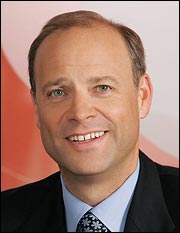2014 may have been a banner year in pharma M&A, but for companies looking to sell off their portfolios of aging meds, it wasn't quite big enough.
Despite a deal storm that's produced $260 billion in agreed-upon transactions so far this year, pharma giants like GlaxoSmithKline ($GSK) and Sanofi ($SNY), looking to dump drugs with expiring patents and waning sales, didn't get very far. And one reason may be that the sellers, which put established product revenue back into R&D, may place higher value on the assets than would-be buyers such as private equity firms, Bloomberg notes.
"There are obstacles to arriving at a price for those kinds of assets," MainFirst Bank analyst Emmanuel Papadakis told the news service.
 |
| Former Sanofi CEO Chris Viehbacher |
GSK recently said it would hang on to its older products after weighing a sale for months, announcing in an SEC filing that it had "evaluated all bids received and has concluded, consistent with its key criteria of maximizing shareholder value, not to pursue divestment of these products." In the case of Sanofi, then-CEO Chris Viehbacher's move to consider selling off the French pharma's older drugs made the company's board feel excluded, fueling it to eventually oust him in late October.
But that doesn't mean other Big Pharma peers won't try their own hands next year--and it doesn't mean they won't succeed. Merck ($MRK) is another candidate to hive off its established drugs, Bloomberg says, and their cash flow and brand names could bring suitors calling in 2015.
"Private-equity firms and trade buyers are still very interested in these assets." Linklaters partner Nigel Jones told the news service. And while reaching a consensus on value could still pose issues, "it's not a matter of lack of funding--there's still money around."
- get more from Bloomberg
Special Reports: Pharma's top 10 M&A deals of H1 2014 | Top 10 pharma companies by 2013 revenue - GlaxoSmithKline - Sanofi